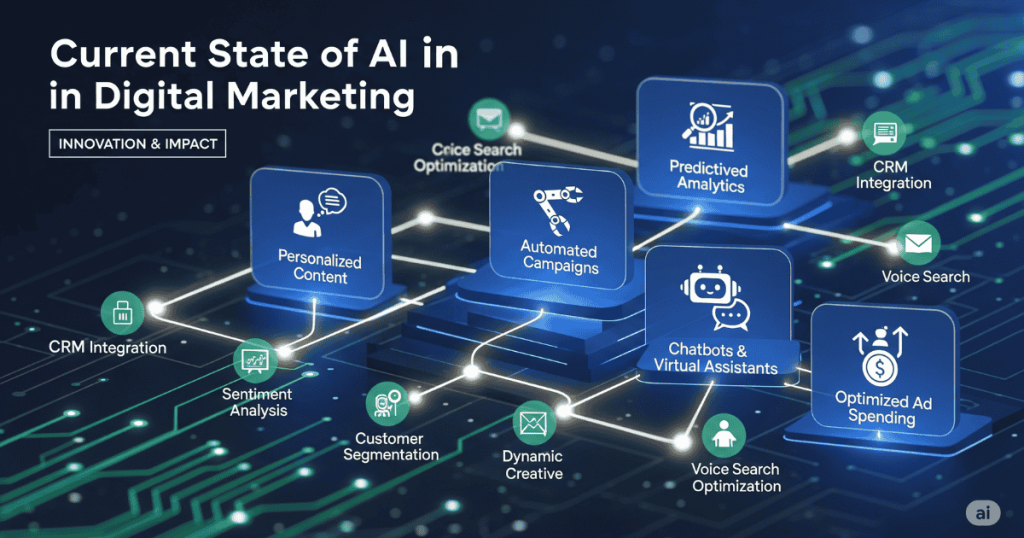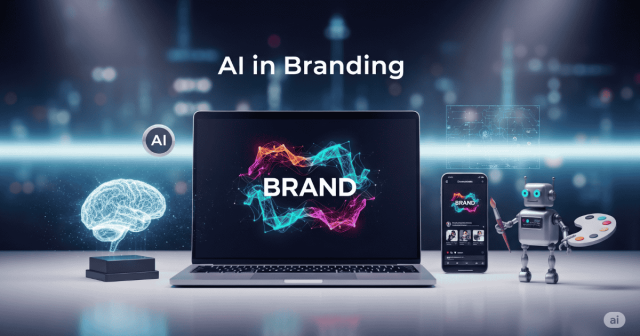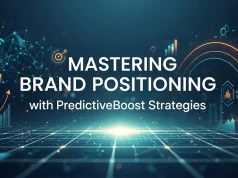Artificial intelligence has moved beyond science fiction into the heart of modern marketing departments. Companies across industries are discovering that AI-powered brand strategies don’t just streamline operations—they unlock entirely new ways to connect with customers and drive growth.
The transformation is happening faster than many anticipated. While traditional branding relied heavily on intuition and broad market research, artificial intelligence in marketing now enables brands to make data-driven decisions with unprecedented precision. From personalized customer experiences to predictive analytics for brand strategy, AI is reshaping how businesses build, maintain, and grow their brand presence.
This shift represents more than just technological advancement. It’s fundamentally changing the relationship between brands and consumers, creating opportunities for deeper personalization while raising important questions about authenticity and human connection. Understanding these changes—and how to leverage them effectively—has become essential for any business looking to remain competitive.
Let’s explore how AI in branding is transforming the marketing landscape and what this means for the future of brand building.
The Current State of AI in Digital Marketing

Digital transformation in branding has accelerated dramatically over the past few years. According to recent industry reports, over 80% of marketing executives are now using some form of AI technology in their campaigns, representing a significant jump from just 20% five years ago.
Smart branding with AI encompasses everything from chatbots that handle customer service inquiries to sophisticated algorithms that predict which products customers are most likely to purchase. Machine learning in branding has evolved to analyze vast amounts of consumer data, identifying patterns that human marketers might miss entirely.
The most successful implementations focus on enhancing human creativity rather than replacing it. AI branding tools now assist with tasks like content creation, audience segmentation, and campaign optimization, freeing up marketing teams to focus on strategy and creative direction.
Companies are seeing measurable results. Brands using AI-driven marketing campaigns report an average increase of 15% in customer engagement and a 12% improvement in conversion rates. These improvements stem from AI’s ability to deliver the right message to the right person at precisely the right moment.
How AI is Transforming Brand Strategy
Predictive Analytics and Consumer Insights
Predictive analytics is one of the strongest ways AI is reshaping modern branding. Today’s AI tools can study customer behavior patterns, purchase history, and engagement metrics to accurately forecast what customers will want next. This level of predictive brand analytics helps brands stay ahead of consumer trends instead of reacting after the market shifts.
Using intelligent consumer behavior insights, AI can highlight emerging opportunities long before competitors notice them. By analyzing search trends, social media sentiment, and real-time purchasing patterns, AI systems can detect subtle changes in customer preferences. These early signals allow brands to make smarter, data-driven brand strategy decisions and move faster than the competition. These insights also support new approaches like AI-infused sensory branding, where brands use data to create more immersive, multi-sensory experiences.
Enhanced Customer Segmentation
Customer segmentation has evolved far beyond basic demographics. With machine learning segmentation, brands can now create detailed behavioral and psychographic profiles that reveal micro-segments with specific needs, motivations, and buying triggers.
This level of advanced customer profiling helps brands design precise, targeted messaging. Instead of sending one generic message to everyone, companies can deliver personalized communication that speaks directly to each audience segment’s interests and pain points. This leads to stronger engagement, higher conversions, and more meaningful customer relationships.
Real-Time Brand Monitoring
AI-powered monitoring systems allow brands to track mentions, sentiment, and reputation across thousands of digital touchpoints at the same time. These real-time brand analytics tools can spot potential PR issues before they grow and highlight opportunities for quick, positive engagement.
Modern AI reputation management goes far beyond basic keyword alerts. Today’s systems can understand context, detect sarcasm, and read subtle language cues, giving brands a much clearer picture of how audiences truly feel. This level of AI brand intelligence helps companies make smarter decisions and protect their image with fast, accurate real-time sentiment detection.
AI-Powered Personalization at Scale
AI-powered personalization is now one of the strongest and most impactful uses of artificial intelligence in modern marketing. Personalization has always mattered, but today’s AI personalization engines make it possible to deliver unique, relevant experiences to millions of customers at once.
AI-driven personalization works by analyzing real-time customer data such as browsing behavior, purchase history, engagement patterns, and individual preferences. With these insights, brands can create hyper-personalized marketing experiences that feel natural and human. This includes customized product suggestions, dynamic website content, smart email personalization, and targeted ads tailored to each user.
Large e-commerce brands have been early adopters, but smaller businesses are now using the same power through AI marketing tools, customer data platforms, and smart automation systems. These tools can instantly change product layouts, update offers, and adjust brand messages based on a customer’s profile. As a result, every visitor gets a smoother, more relevant, and more data-driven customer journey.
However, successful AI personalization requires a balance between automation and authenticity. Customers want relevant content, but they also crave a brand voice that feels human and trustworthy. The best strategies use AI to enhance storytelling, build emotional connections, and strengthen personalized brand interactions—without making the experience feel robotic or overly automated.
AI Marketing Trends Shaping 2026
Several AI marketing trends are emerging that will define the branding landscape in 2026 and beyond. Understanding these trends helps brands prepare for the next wave of AI-driven transformation.
Voice and Conversational AI
Voice search and conversational AI are reshaping how consumers discover and interact with brands. Smart speakers, voice assistants, and conversational interfaces require brands to adapt their messaging for audio-first interactions.
This shift demands new approaches to brand positioning and messaging. Brands must consider how their value propositions translate to voice interactions and ensure their content is optimized for voice search queries.
Visual Recognition and Augmented Reality
AI-powered visual recognition technology enables brands to create immersive experiences that blend digital and physical worlds. Customers can use their smartphones to interact with products, access information, and even make purchases through visual interfaces.
Augmented reality applications powered by AI are becoming more sophisticated, allowing brands to offer virtual try-on experiences, interactive product demonstrations, and location-based marketing activations.
Ethical AI and Transparency
As AI becomes more prevalent in branding, consumers are increasingly concerned about data privacy and algorithmic transparency. Brands are responding by implementing ethical AI practices and communicating clearly about how they use customer data.
This trend toward transparency is becoming a competitive advantage. Brands that can demonstrate responsible AI use while delivering excellent customer experiences are building stronger trust relationships with their audiences.
Implementing AI Branding Tools Successfully
Success with AI in branding requires more than just adopting new technology. Brands must build smart, strategic approaches that connect AI capabilities with real business goals and customer needs. This is the foundation of AI-driven branding strategies.
Start with Clear Objectives
The most effective AI implementations begin with clear, measurable goals. Instead of using AI simply because it’s popular, brands should identify specific problems or growth opportunities where AI marketing tools can make a real impact.
Common goals include lowering customer acquisition costs, increasing engagement rates, boosting customer lifetime value, or improving content production through intelligent automation. These targeted objectives help brands pick the right tools, refine their data-driven branding approach, and measure results more accurately.
Invest in Data Quality
AI systems depend heavily on clean, accurate data. To get reliable insights, brands need strong data collection methods, organized data management, and privacy-compliant systems. This ensures the information feeding machine learning systems is trustworthy and useful.
High-quality data allows AI to generate better predictions, deeper customer insight analytics, and stronger personalization results. In many cases, improving data infrastructure offers more value than simply buying more advanced AI software.
Balance Automation with Human Oversight
AI can automate many branding tasks, but human judgment is still essential. Brands need a healthy balance where AI handles repetitive work, while humans guide creativity, messaging, and brand storytelling.
For example, content creation often needs strong human input, while tasks like campaign optimization or audience segmentation can be supported by digital brand optimization tools. Finding the right mix requires testing, learning, and ongoing adjustment.
Challenges and Considerations
Despite its potential, AI in branding presents several challenges that companies must navigate carefully.
Maintaining Brand Authenticity
One of the biggest concerns about AI-driven marketing is the potential loss of authentic human connection. Customers value genuine brand relationships, and over-reliance on AI can make interactions feel impersonal or manipulative.
Successful brands use AI to enhance authentic storytelling rather than replace it. They leverage AI insights to understand customer needs better while maintaining human creativity in crafting brand messages and experiences.
Privacy and Data Concerns
AI-powered personalization requires extensive customer data collection, raising privacy concerns among consumers and regulators. Brands must balance personalization benefits with privacy protection to maintain customer trust.
Transparent data practices, clear privacy policies, and giving customers control over their data help address these concerns while enabling AI-driven personalization.
Technical Complexity and Costs
Implementing sophisticated AI systems can be complex and expensive, particularly for smaller brands. The technical expertise required to deploy and maintain AI tools may exceed internal capabilities.
Many brands are addressing this challenge by partnering with AI service providers or using cloud-based AI platforms that reduce technical barriers to entry.
Measuring AI Branding Success

Measuring success is essential for improving any AI-driven branding strategy. Traditional marketing metrics often fail to show the full impact of advanced automation and personalization, so brands need smarter ways to evaluate performance. This is where AI performance metrics and modern branding analytics come in.
Key indicators of AI success include engagement quality, personalization accuracy, customer lifetime value growth, and overall operational efficiency. These AI-driven insights help brands understand both the short-term results and the long-term benefits of their technology investments. They also show how well the brand is connecting with customers through data-driven experiences.
Regular testing is also important. A/B testing, customer feedback analysis, and real-time performance monitoring help brands fine-tune their systems. These actions improve machine learning models, boost personalization, and support continuous campaign optimization. Over time, this leads to better results and stronger AI ROI tracking.
The Future of AI in Branding
The future of artificial intelligence in marketing will bring even more advanced and powerful capabilities. New technologies such as advanced natural language processing (NLP), emotional AI, and even quantum-powered analytics will open up fresh opportunities for brand growth and deeper customer engagement.
AI systems will also become more connected. Different tools will work together smoothly through unified platforms that handle everything from customer acquisition to retention. These next-gen AI-driven marketing platforms will offer brands complete, end-to-end solutions for personalization, automation, and intelligent decision-making.
But even with all these advancements, the human role will remain crucial. The strongest brands will be the ones that use AI to support and elevate human creativity, not replace it. This human–AI collaboration will shape the future of AI-powered brand experiences, helping companies stay innovative while keeping their storytelling authentic and meaningful.
Embracing the AI-Powered Brand Future
AI in branding represents a fundamental shift in how companies build relationships with customers. The technology offers unprecedented opportunities for personalization, efficiency, and insight, but success requires thoughtful implementation that maintains authentic brand connections.
Brands that embrace AI while preserving their human elements will be best positioned to thrive in this new landscape. The key lies not in choosing between human creativity and artificial intelligence, but in finding ways to combine both for maximum impact.
The transformation is already underway. Companies that begin experimenting with AI-powered brand strategies now will have significant advantages as these technologies become standard practice. The future belongs to brands that can harness AI’s power while maintaining the authentic connections that make them memorable and meaningful to customers.
FAQs
1. How is AI changing modern branding?
AI helps brands understand customers better, predict trends, and deliver personalized experiences. It makes branding faster, smarter, and more data-driven.
2. Why is AI-powered personalization important?
Personalization makes customers feel understood. AI can create tailored product suggestions, messages, and offers for each user, improving engagement and conversions.
3. Can AI replace human creativity in branding?
No. AI supports creativity but doesn’t replace it. AI handles data and automation, while humans provide emotion, storytelling, and brand personality.
4. What challenges do brands face when using AI?
The biggest challenges include keeping customer data safe, maintaining brand authenticity, and managing the technical costs of AI tools.
5. How can small businesses use AI in branding?
Small businesses can use affordable AI tools for social media content, customer segmentation, email personalization, and real-time brand monitoring without big budgets.




